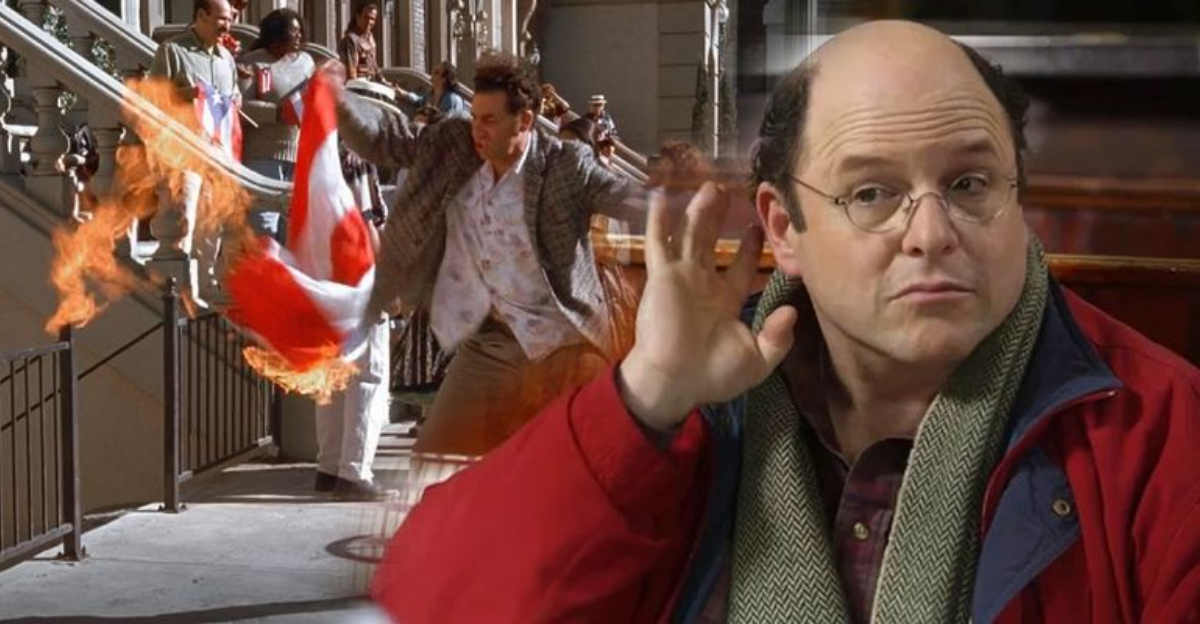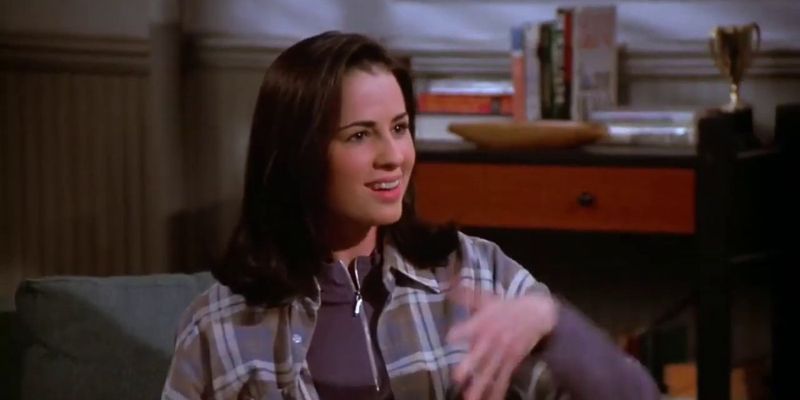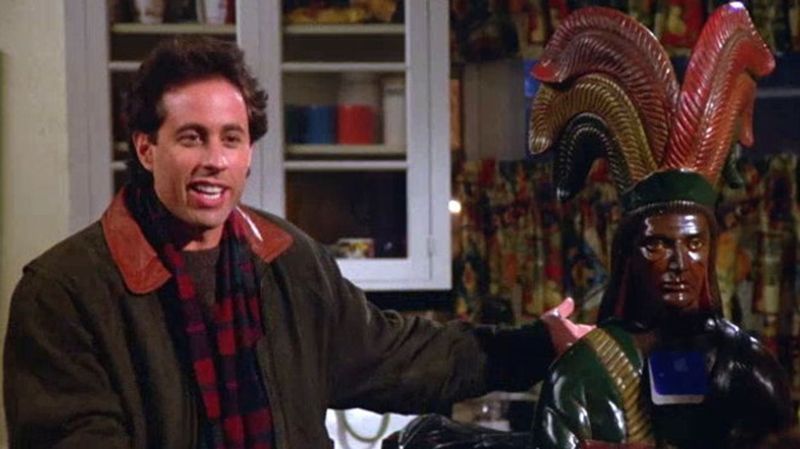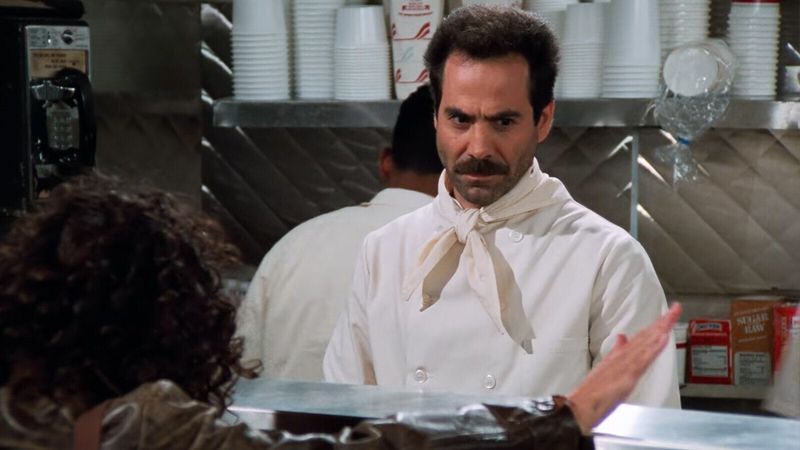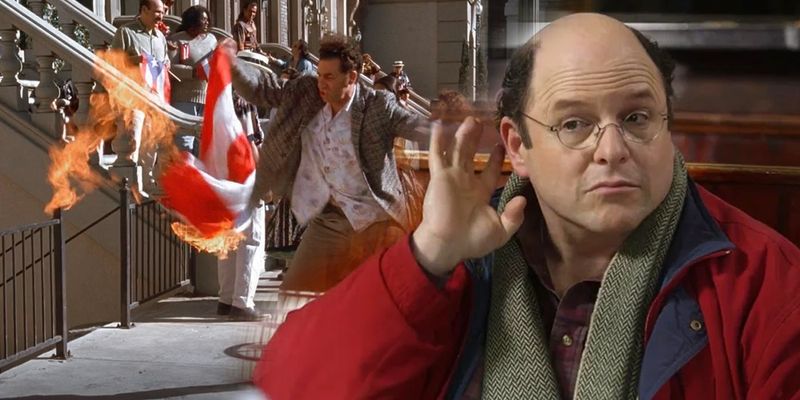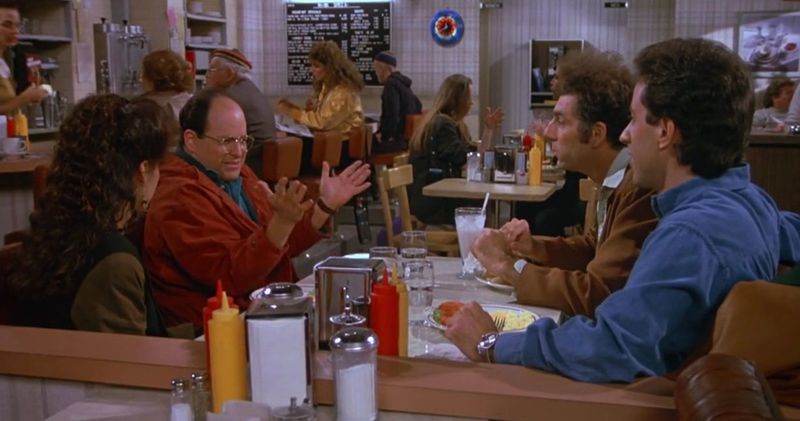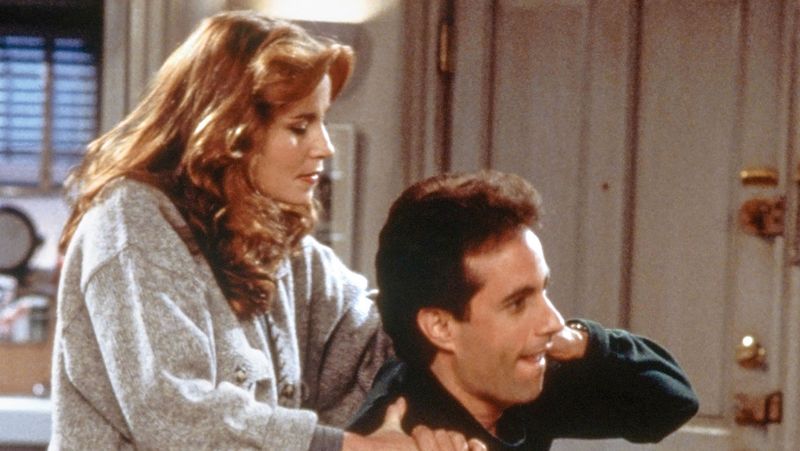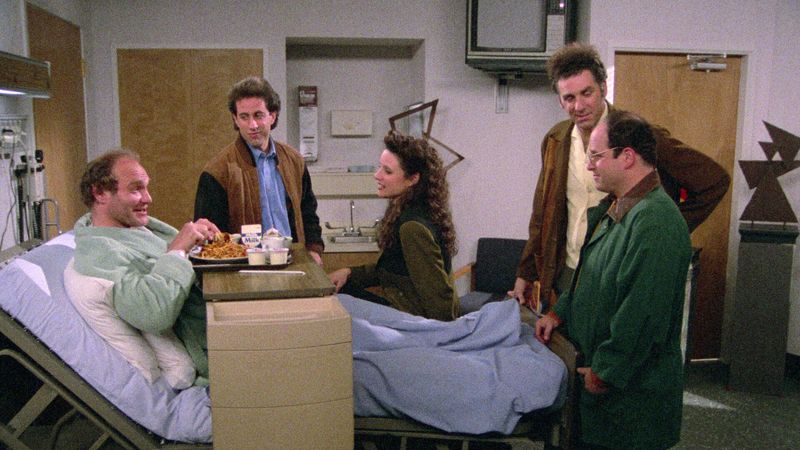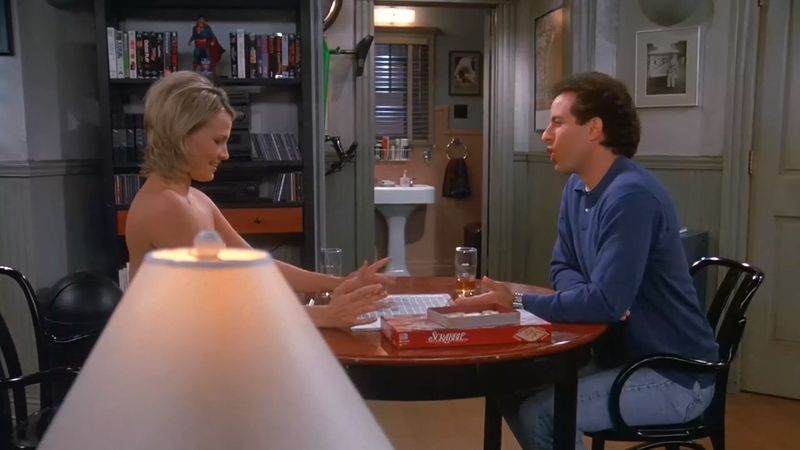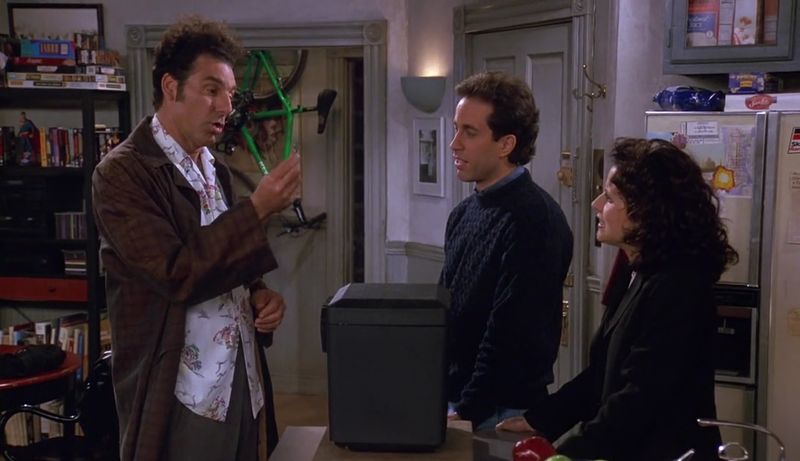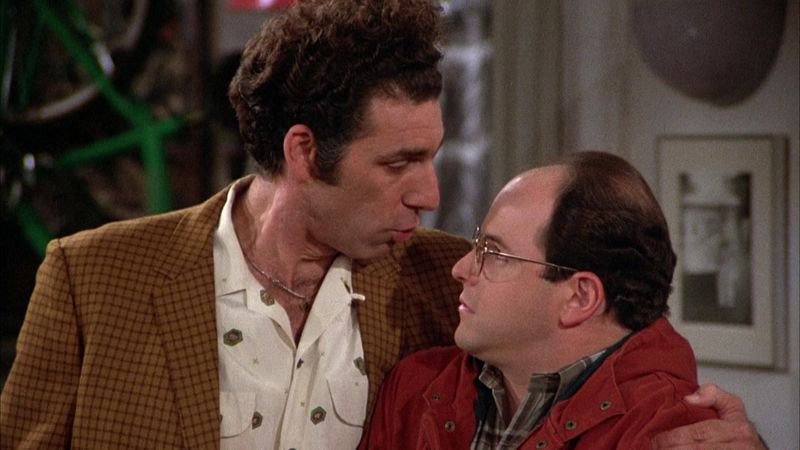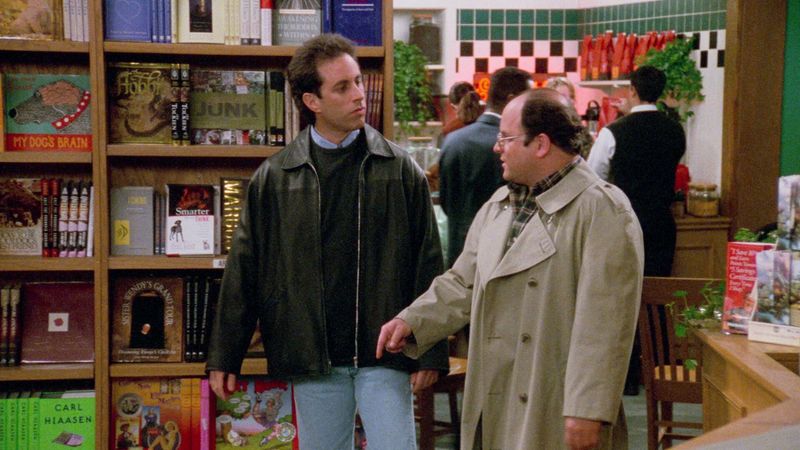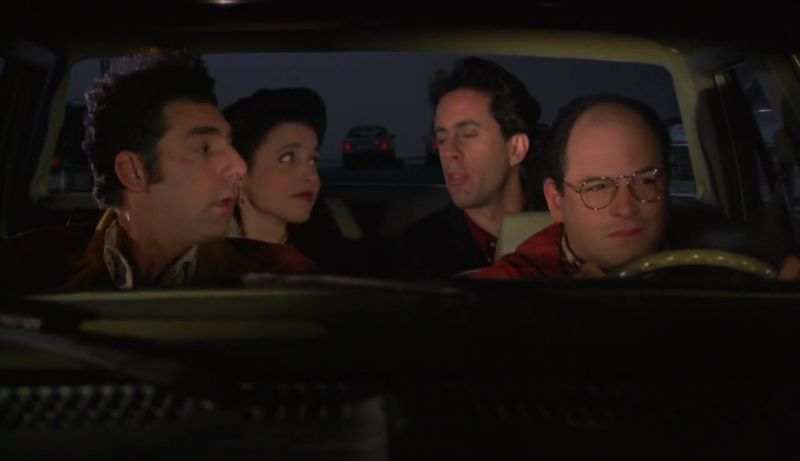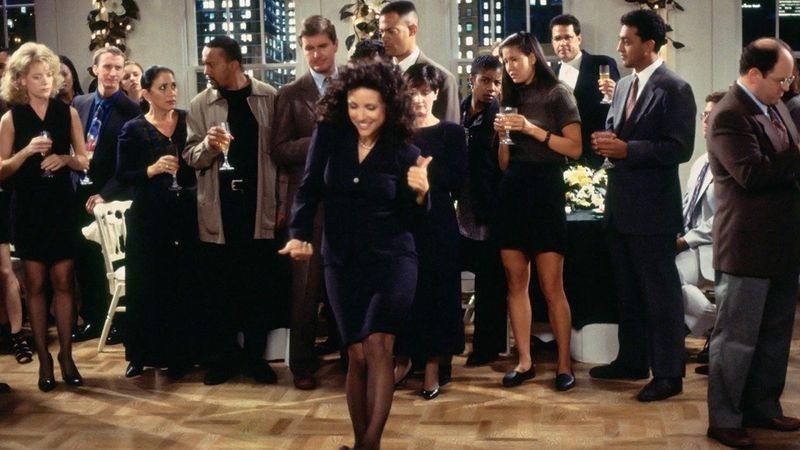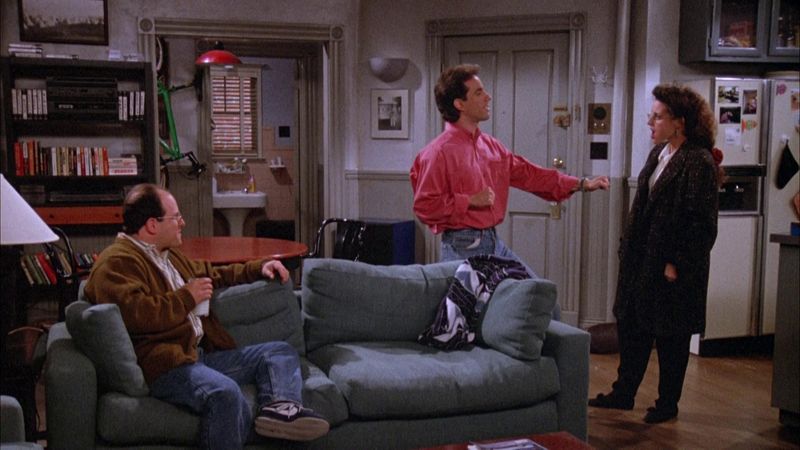Seinfeld remains one of the most iconic sitcoms of all time, renowned for its wit and humor. However, comedy evolves, and some jokes that were acceptable in the ’90s might not be today.
While these jokes were hilarious back then, they might not land the same way now. Let’s explore 15 Seinfeld jokes that entertained audiences but could spark outrage today.
1. The Outing
In “The Outing” (Season 4, Episode 17), Jerry and George are mistakenly identified as a couple, leading to the famous catchphrase, “Not that there’s anything wrong with that.”
This episode humorously tackled the topic of mistaken identity, yet today, it might be seen as insensitive to the complexities of LGBTQ+ identities. It reflects a time when the idea of same-sex relationships was not as normalized as it is now.
Today, the episode could be interpreted as trivializing serious social issues, despite its lighthearted intent. Viewers may find the humor outdated in a more inclusive society.
2. The Cigar Store Indian
“The Cigar Store Indian” (Season 5, Episode 10) revolved around Jerry’s insensitivity towards Native American culture. He gifts Elaine a cigar store Indian, oblivious to the racial stereotypes it embodies.
This episode highlights casual insensitivity, which was common at the time but is now recognized as problematic. Today, such portrayals would likely be criticized for reinforcing harmful stereotypes.
The humor derived from this cultural misunderstanding might spark outrage now, as society has grown more aware of the importance of respecting and accurately representing diverse cultures in media and comedy.
3. The Jimmy
In “The Jimmy” (Season 6, Episode 19), Kramer’s mistaken belief that jazz singer Mel Tormé is being kind to him because he’s “mentally challenged” reflects humor that today would be seen as insensitive.
The joke plays on the misunderstanding of disabilities, a subject that demands careful handling in modern comedy. What was once seen as quirky humor could now be viewed as perpetuating misconceptions about individuals with disabilities.
This episode illustrates how perceptions have shifted, urging creators to craft jokes that are both considerate and funny without relying on outdated stereotypes.
4. The Soup Nazi
“The Soup Nazi” (Season 7, Episode 6) introduces a character whose strict demeanor and catchphrase, “No soup for you!” became legendary. However, the comedic portrayal of his ethnic identity might be seen as problematic today.
While the character is a staple of ’90s humor, modern audiences might interpret such portrayals as reinforcing negative stereotypes.
The humor hinges on cultural eccentricities, which might not align with today’s sensitivity towards diverse backgrounds. Despite its iconic status, the episode showcases how evolving perceptions encourage more nuanced representations in comedy and media.
5. The Puerto Rican Day
“The Puerto Rican Day” (Season 9, Episode 20) features a controversial scene where a Puerto Rican flag is inadvertently burned, leading to public outcry. This episode was banned after its initial airing due to its insensitivity towards Puerto Rican culture.
While intended as a comedic mishap, the portrayal of flag burning is now understood as highly offensive, sparking discussions about respect for cultural symbols.
Such content would likely face significant backlash in today’s climate, highlighting the need for comedy to tread carefully when addressing culturally significant symbols and events.
6. The Contest
“The Contest” (Season 4, Episode 11) broke new ground with its subtle approach to discussing self-pleasure. The episode centers on a bet about who can abstain the longest, using clever innuendo.
While groundbreaking at the time, today’s audiences might expect a more open and respectful conversation about such topics. The humor lay in the taboo nature of the subject, which was rarely discussed openly on television.
In contemporary settings, the episode could face criticism for not adequately addressing the complexities surrounding the topic, urging writers to balance humor with sensitivity.
7. The Masseuse
In “The Masseuse” (Season 5, Episode 9), Jerry’s attempts to persuade his girlfriend, a professional masseuse, to give him a massage borders on coercion.
This storyline might be perceived as problematic today, as it touches on consent and professional boundaries. While intended as humor, the pressure Jerry applies reflects dynamics that modern audiences might find troubling.
The narrative showcases a shift in understanding of personal autonomy and respect in relationships, highlighting the importance of navigating such subjects with care and sensitivity in comedy.
8. The Junior Mint
“The Junior Mint” (Season 4, Episode 20) features Elaine’s attraction to a man primarily due to his weight loss, presenting humor that might be criticized today.
The focus on physical appearance as a basis for attraction has become a sensitive topic, with society advocating for body positivity and self-acceptance. While the episode portrayed a lighthearted romantic interest, today’s audiences might interpret it as reinforcing superficial standards.
The shift in cultural attitudes towards body image encourages more inclusive and diverse storytelling, moving beyond outdated beauty ideals.
9. The Apology
In “The Apology” (Season 9, Episode 9), Jerry’s discomfort with his girlfriend’s uninhibited nudity transitions from attraction to disgust. This episode navigates the boundaries of personal freedom and societal norms.
While it humorously explores the perception of nudity, today’s audiences might question the underlying judgments about natural behavior.
The humor derived from personal preference might not resonate as well now, as societal attitudes have shifted towards embracing individuality and body positivity. The storyline prompts reflection on how comedy can evolve to respect diverse perspectives.
10. The Strongbox
In “The Strongbox” (Season 9, Episode 14), George’s refusal to break up with a woman who doesn’t realize they’re no longer together reflects humor that might be deemed insensitive today.
The comedic tension arises from a lack of communication and respect for personal agency. Modern audiences might view this storyline as trivializing serious relationship dynamics, including consent and closure.
The episode highlights how comedy has evolved to prioritize respectful interactions, showcasing the importance of mutual understanding and communication in relationships, even in humorous contexts.
11. The Red Dot
“The Red Dot” (Season 3, Episode 12) centers on George gifting a cashmere sweater with a defect to a cleaning lady, leading to a comedic yet problematic encounter.
The storyline involves George’s ulterior motives and subsequent indiscretion, which today might be seen as an inappropriate workplace dynamic. The humor derived from unethical behavior and power dynamics might not sit well with contemporary audiences.
This episode reflects changing perceptions of workplace relationships, encouraging more thoughtful storytelling that respects individuals’ dignity and professional boundaries.
12. The Bookstore
In “The Bookstore” (Season 9, Episode 17), Jerry and George’s antics of shoplifting and the ensuing chaos could be perceived differently today.
The humor lies in their bumbling misadventures, yet modern viewers might view their actions as trivializing crime. This episode highlights a shift in how comedic narratives are constructed, with a focus on more responsible and ethical behavior.
The storyline reflects a time when humor often overlooked moral implications, urging creators to balance comedic elements with an awareness of the impact of portrayed actions on audiences.
13. The Handicap Spot
“The Handicap Spot” (Season 4, Episode 22) involves the gang’s careless use of a disabled parking space, leading to a series of unfortunate events.
The comedic mishap underscores a lack of awareness regarding accessibility and respect for individuals with disabilities. Today, such behavior would likely be criticized, as society has become more cognizant of the importance of inclusivity and consideration for all individuals.
This episode encourages reflection on societal growth and the need for humor that is mindful of diverse experiences and respectful of all community members.
14. The Little Kicks
Elaine’s iconic dance in “The Little Kicks” is a prime example of Seinfeld’s unique humor. Her awkward, jerky moves were intended to be embarrassing yet hilarious, highlighting her lack of self-awareness.
While funny, the joke relies heavily on public shaming, which might not be as acceptable today. Social dynamics around workplace behavior have shifted significantly, with greater emphasis on respect and individuality.
This episode invites reflection on how humor can sometimes tread into uncomfortable territory, making us rethink what we find funny and why. In a more inclusive world, jokes about personal quirks may be less appreciated.
15. The Good Samaritan
“The Good Samaritan” (Season 3, Episode 20) follows Jerry as he attempts to track down a woman involved in a hit-and-run, driven by attraction rather than justice. This storyline raises ethical questions about motivations and priorities.
While played for laughs, the narrative might not sit well with modern viewers who value accountability and integrity. The episode highlights a time when comedic plots often prioritized humor over moral consequences.
Today, audiences might expect a more thoughtful approach, respecting ethical considerations while still delivering engaging humor.
